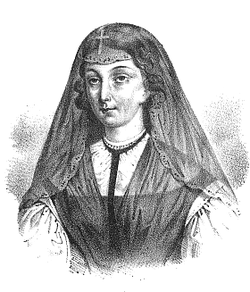Elżbieta Drużbacka

Elżbieta Drużbacka (née Kowalska, 1695 or 1698 – March 14, 1765 in Tarnów) was a Polish poet of the late Baroque period. Little is known of her life. She learned French at the court of Elżbieta Sieniawska. She married a Jewish man, and had two daughters, After she was widowed, she moved to the Bernardine monastery at Tarnów, where she died. Her best known work is Opisanie czterech części roku ("Description of the Four Seasons").
Biography
[edit]Little is known of the life of Drużbacka. Twenty-seven of her letters survive.[1][2]
She was born around 1695 to the Kowalski family, and may have grown up in Greater Poland, Pomerania or Red Ruthenia.[2] She learned French at the court of Elżbieta Sieniawska, the wife of Adam Mikołaj Sieniawski and a renowned patron of the arts. It is not known what other education Drużbacka received.[2]
She was married some time between 1720 and 1726 to Kazimierz Drużbacki, a Jewish treasurer, and they had two daughters together.[2][3] Their first daughter died young, but the second, Marianna, married Andrzej Wiesiołowski.[2] Drużbacka’s husband died around 1740, and she became the patron of Sieniawskie's daughter. Later she resided in the Bernardine monastery at Tarnów, where she died on 14 March 1765.[2]
One of Drużback’s granddaughters was the grandmother of Aleksander Fredro, the Polish poet, playwright and author.[2]
Much of Drużback’s work deals with the beauty of nature; her best known work is Opisanie czterech części roku ("Description of the Four Seasons"). Other works include Life of David, Life of Mary Magdalen, Syloreta, Argenida, Story of Prince Adolf and Ortoban and Terlida.[4] Her work is considered to have been influenced by the Polish poet, Waclaw Potocki.[4]
The only volume of her work published in her lifetime was put together by bishops Józef Andrzej Załuski and Andrzej Stanisław, the creators of the Załuski library.[3] Her manuscripts were archived in the Krasiński Library, but were destroyed in the Warsaw Uprising.[3]
References
[edit]- ^ Stasiewicz, Krystyna (1992). Elżbieta Drużbacka, najwybitniejsza poetka czasów saskich. Wyższa Szkoła Pedagogiczna w Olsztynie.
- ^ a b c d e f g "Elżbieta Drużbacka. Utalentowana praprababka Aleksandra Fredry". Polskie Radio 24 (in Polish). Retrieved 2025-04-03.
- ^ a b c "Elżbieta Drużbacka". Lubimyczytać.pl (in Polish). Retrieved 2025-04-03.
- ^ a b "Elżbieta Drużbacka". Infinite Women. Retrieved 2025-04-03.
External links
[edit]- Opisanie czterech części roku, fragment (in Polish)
